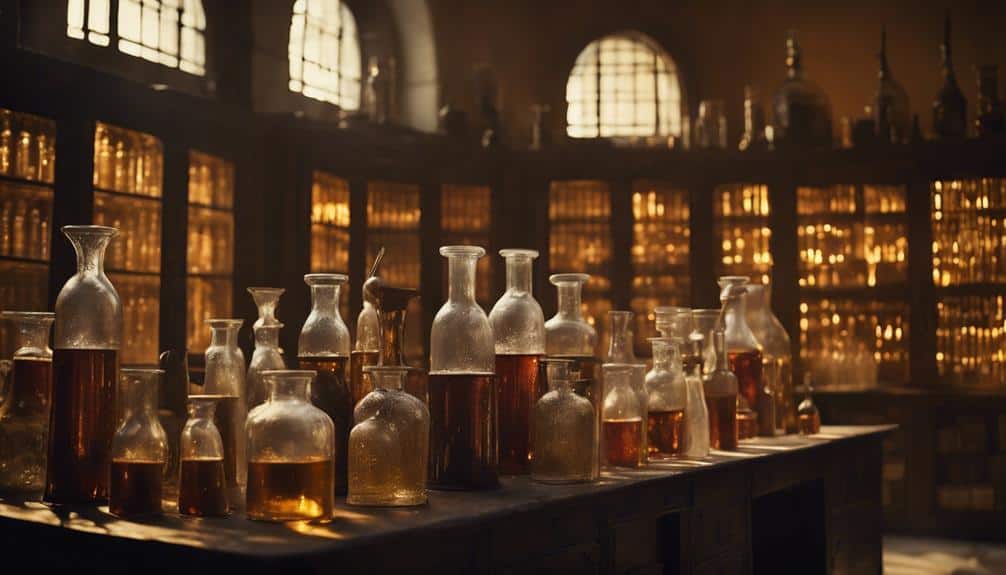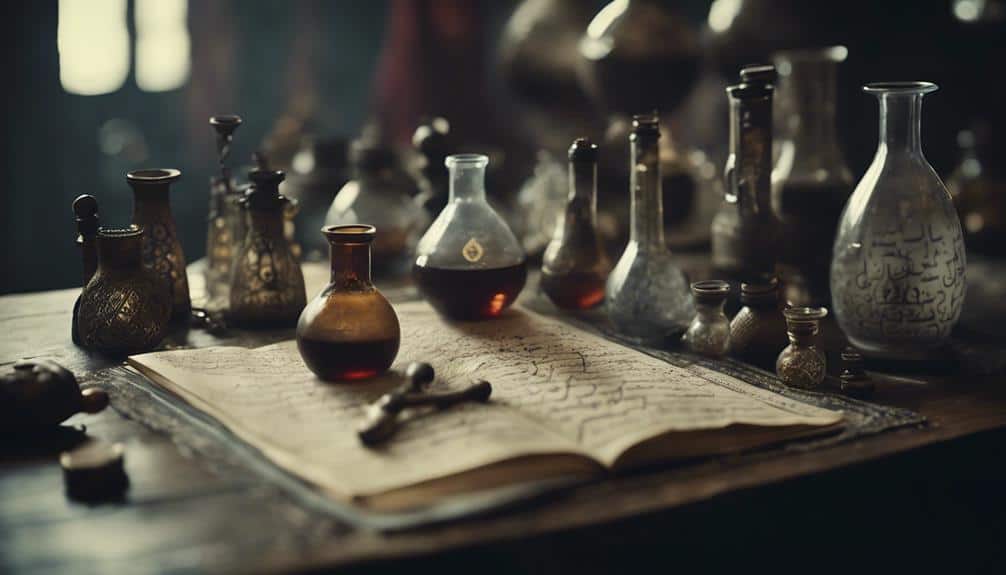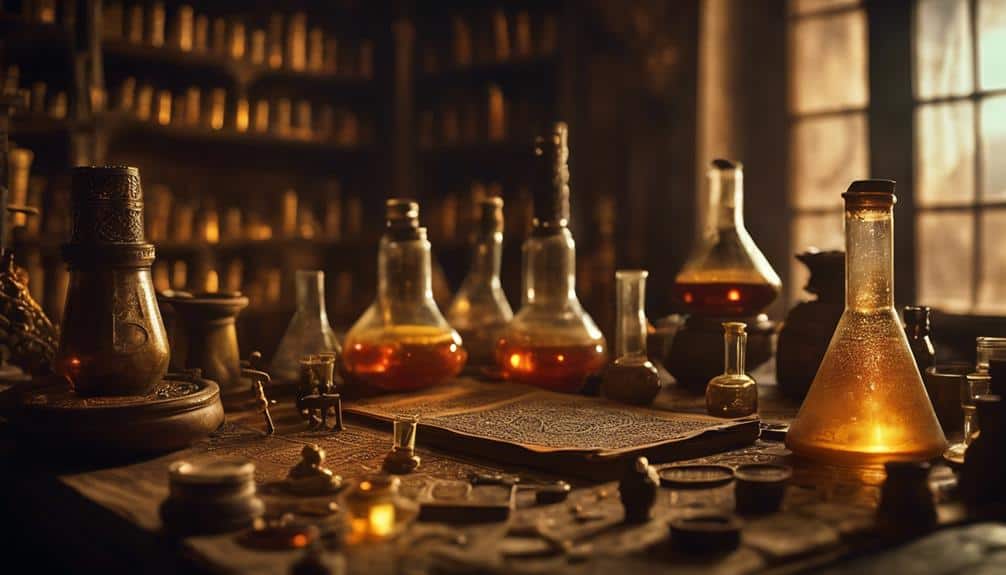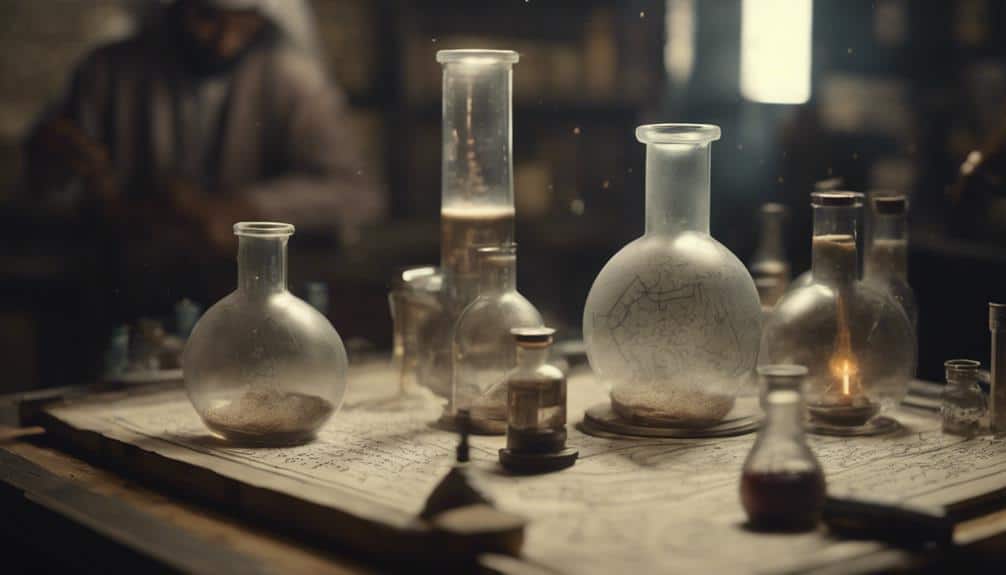Islamic scientists like Jabir Ibn Hayyan and Al-Razi revolutionized alchemy by embracing empirical methods and advancing techniques like distillation and crystallization.
Their groundbreaking work laid the foundation for modern chemistry and influenced European scientific methodologies, sparking a transformative era in science.
Islamic Alchemy and Its Origins
Islamic alchemy, which emerged from the confluence of ancient Chinese and early Egyptian practices, underwent a significant transformation as Islamic scholars stripped it of its mystical elements and grounded it in empirical science. In its early stages, alchemy was heavily imbued with folklore and occult beliefs. However, Islamic scholars, particularly figures like Jabir ibn Hayyan, played a pivotal role in refining and legitimizing it.
You'll find that Islamic alchemy was primarily concerned with the transformation of metals, a process often shrouded in mysticism. Yet, Islamic scholars distinguished themselves by rejecting supernatural explanations and focusing on observable, repeatable processes. They emphasized empirical methods, laying the groundwork for modern chemistry. This shift was monumental, as it marked a clear departure from the esoteric roots of alchemy and steered it towards a more scientific approach.
Jabir ibn Hayyan, often regarded as the father of Islamic alchemy, exemplified this transformation. His works systematically documented chemical processes and experiments, consequently moving alchemy away from mere speculation.
Key Contributions of Islamic Alchemists

You'll find that Islamic alchemists like Jabir Ibn Hayyan and Al-Razi revolutionized chemistry through transformative practices and advanced techniques.
They systematically documented methods for refining metals and producing substances such as inks, acids, and varnishes.
Their proto-scientific approaches greatly influenced the transfer of alchemical knowledge to Europe, shaping the development of modern chemistry.
Transformative Alchemical Practices
While delving into the transformative alchemical practices of the Islamic Golden Age, you'll find that the fusion of diverse antique traditions greatly advanced both mystical and practical aspects of alchemy. Islamic alchemy, driven by figures like Jābir ibn Ḥayyān, emphasized the transformative process not just of materials, but also of the alchemist's psyche.
Mystical alchemy in this scenario was deeply intertwined with the love of God, which acted as a catalytic fire for personal and spiritual growth. Jābir ibn Ḥayyān, often hailed as the father of Islamic alchemy, integrated Aristotelian logic and Hellenic philosophies into his alchemical practices. This synthesis allowed for a more profound exploration of the psyche, where the God-image and poetic language played significant roles.
The coniunctio motif, representing unity and the merging of opposites, frequently appeared in alchemical texts, symbolizing both chemical and spiritual transformations. Islamic alchemists didn't just seek to transform base metals into gold; they aimed to purify their souls.
The emphasis on inner psychic experiences and the transformative power of divine love set Islamic alchemy apart, making it a unique and pivotal chapter in the history of science.
Advances in Chemical Techniques
Pioneering advanced techniques like distillation, filtration, and crystallization, alchemists during the Islamic Golden Age revolutionized chemical practices and methodologies. Figures such as Jābir ibn Ḥayyān meticulously documented these processes, enabling the refinement of metals and the creation of new substances. Their work on distillation, for instance, was pivotal for producing pure alcohols and essential oils, which had numerous applications.
Filtration and crystallization allowed for the purification of chemicals, setting the stage for more sophisticated laboratory practices.
Islamic alchemists didn't just focus on theoretical knowledge; they emphasized practical experimentation. This hands-on approach led to significant breakthroughs in understanding mineral acids like nitric acid and aqua regia. These substances were essential in metalworking and other industrial processes.
By developing practical methods for producing alkalis, they advanced glassmaking and soap production, essential industries of their time.
Their contributions laid the groundwork for modern chemistry. The techniques and knowledge they developed weren't confined to the Islamic world; they influenced European scientists and facilitated the transmission of scientific knowledge from the East to the West. Understanding these advancements helps you appreciate the foundational role Islamic alchemists played in the evolution of modern science.
Prominent Islamic Alchemists

Among the most transformative figures in the field of alchemy, four prominent Islamic alchemists — Jabir Ibn Hayyan, Al-Razi, Ibn Umayl, and Al-Tughrai — stand out for their groundbreaking contributions and emphasis on empirical methods.
Jabir Ibn Hayyan, often hailed as the father of chemistry, authored over 3,000 texts, laying foundational principles in alchemy and influencing both Eastern and Western scientific thought. His meticulous approach to experimentation set a new standard for alchemical practices.
Al-Razi, a distinguished Persian physician, expanded the scope of alchemy through works like the 'Secret of Secrets.' His focus on the practical application of alchemical knowledge in medicine highlighted the interplay between chemistry and healthcare.
Ibn Umayl, a 10th-century Egyptian alchemist, is renowned for his allegorical text, 'The Book on Silvery Water and Starry Earth,' which explores the symbolic nature of alchemical substances.
Al-Tughrai, an 11th-12th century scholar, penned 'The Lanterns of Wisdom and the Keys of Mercy,' blending philosophical insights with alchemical practices. Collectively, these Islamic alchemists not only advanced alchemy but also laid the groundwork for modern chemistry through their commitment to empirical investigation and practical knowledge.
Alchemical Processes and Techniques

Islamic alchemists transformed scientific inquiry by developing and refining techniques such as distillation, filtration, and amalgamation, which became foundational practices in the evolution of modern chemistry. They meticulously explored these alchemical processes to understand and manipulate matter.
Distillation was essential for substance purification. By heating a substance and collecting the resulting vapors, they could separate components based on differing boiling points, achieving a higher purity level.
Filtration, another critical technique, allowed alchemists to separate impurities from substances. By passing mixtures through porous materials, they effectively isolated desired elements from unwanted particles.
Amalgamation, the process of combining different substances to create new compounds, was extensively explored. This method enabled alchemists to experiment with various materials, leading to significant discoveries and advancements in compound formation. These techniques weren't merely procedural but were underpinned by a deep understanding of the properties and behaviors of different substances.
To better understand these processes, consider:
- Distillation: Used for refining liquids by heating and condensing.
- Filtration: Employed to separate solids from liquids or gases.
- Amalgamation: Combining metals and other elements to form new alloys.
- Substance purification: Achieving higher purity through careful separation techniques.
Transmission of Alchemical Knowledge

The transmission of alchemical knowledge from the Islamic world to Europe, primarily through translations by scholars like Robert of Chester and Gerard of Cremona, fundamentally altered the trajectory of Western scientific thought and practice. You can trace this pivotal exchange back to the 12th century when European scholars began translating key alchemical texts from Arabic into Latin.
Among the most influential figures was Jabir Ibn Hayyan, whose extensive works on alchemy were meticulously translated and studied. Robert of Chester's translation of the 'Book of the Composition of Alchemy' in 1144 and Gerard of Cremona's efforts to translate various alchemical manuscripts played critical roles in this knowledge transfer. By converting these texts into Latin, they made the intricate concepts and sophisticated techniques of Islamic alchemy accessible to a broader European audience.
This transmission wasn't just a simple exchange of ideas; it laid the groundwork for future scientific endeavors. These Latin translations didn't merely preserve the original knowledge but also allowed European scholars to build upon it. The alchemical texts brought new methodologies and theoretical frameworks that would eventually lead to the evolution of alchemy into modern chemistry.
This cross-cultural exchange underscores the interconnectedness of scientific progress and the enduring impact of Islamic contributions to Western science.
Impact on Modern Chemistry

You can see how Islamic alchemists like Jabir Ibn Hayyan revolutionized the scientific landscape by prioritizing experimental methodologies and practical applications. Their innovative chemical processes not only refined metals and created new substances but also laid a solid foundation for modern chemistry.
Additionally, their influence on Western science through the transmission of alchemical knowledge was pivotal in shaping contemporary chemical practices.
Experimental Methodology Adoption
Jabir Ibn Hayyan's pioneering emphasis on practical knowledge and rigorous experimentation laid the groundwork for the scientific method that modern chemistry relies on today. By focusing on experimental methodology, Jabir bridged the gap between alchemy and chemistry, making significant contributions to the scientific landscape of the Islamic world and beyond. His approach wasn't just about theory; it was about hands-on experimentation and precise documentation.
Jabir's texts, attributed to Geber in Latin, are treasure troves of chemical processes like precipitation, distillation, and crystallization. These weren't just random experiments but systematic methods aimed at improving the quality and purity of substances. His work laid the foundation for the repeatability and reliability that are hallmarks of the scientific method.
To understand Jabir's impact, consider these key points:
- Practical Knowledge: Jabir stressed the importance of hands-on experimentation over theoretical speculation.
- Rigorous Experimentation: His methods were systematic, aiming for reproducibility and precision.
- Bridging Alchemy and Chemistry: He transformed mystical alchemy into a more empirical science.
- Influence on Europe: Jabir's works permeated European scientific thought, influencing future chemists.
Innovative Chemical Processes
In modern chemistry, the innovative chemical processes developed by Islamic scientists have left a lasting legacy, fundamentally shaping methods and applications in fields ranging from pharmaceuticals to materials science.
One of the most influential figures, Jabir Ibn Hayyan, often referred to as the father of chemistry, introduced techniques that remain central to the discipline today. His contributions to distillation, crystallization, and purification processes established foundational practices for refining metals, creating new compounds, and purifying substances.
Jabir Ibn Hayyan's detailed documentation of distillation methods revolutionized the way we purify liquids and separate components. This process is essential in modern chemistry for producing pure substances, especially in pharmaceuticals where purity is crucial.
The crystallization techniques he developed are vital for forming solid crystals from solutions, an important method in materials science for creating new materials with specific properties.
Islamic science, with its rigorous approach to experimentation and documentation, has ensured these techniques have stood the test of time. The methods pioneered by Islamic scientists like Jabir Ibn Hayyan continue to influence modern chemistry, driving advancements in industrial production and the development of new materials.
Their legacy is a proof to the enduring impact of their innovative chemical processes.
Influence on Western Science
Islamic alchemists' careful experimentation and thorough documentation laid the groundwork for many principles that modern Western science would later adopt and refine. Through their work in refining metals, creating new substances, and pioneering proto-scientific methods, Islamic alchemists greatly influenced the evolution of modern chemistry. Their contributions were essential in bridging the gap between ancient practices and contemporary scientific approaches.
Arabic alchemy's impact on Western science can be seen in several ways:
- Transmission of Knowledge: Islamic scholars translated and preserved ancient Greek and Roman texts, later transmitting this knowledge to Europe.
- Experimental Methodology: The rigorous experimental techniques developed by Islamic alchemists were adopted by Western scientists, forming the backbone of the scientific method.
- Division of Chemistry: The distinction between organic and inorganic chemistry, a fundamental concept in the history of chemistry, was markedly influenced by Islamic contributions.
- Influence on Later Scientists: Pioneers like Jabir ibn Hayyan and Al-Razi laid the foundations that later scientists like Robert Boyle and Antoine Lavoisier built upon.
Understanding these contributions gives you a clearer picture of how Islamic alchemy shaped the development of Western science and the history of chemistry. It's a reflection of how interconnected and cumulative scientific progress truly is.


